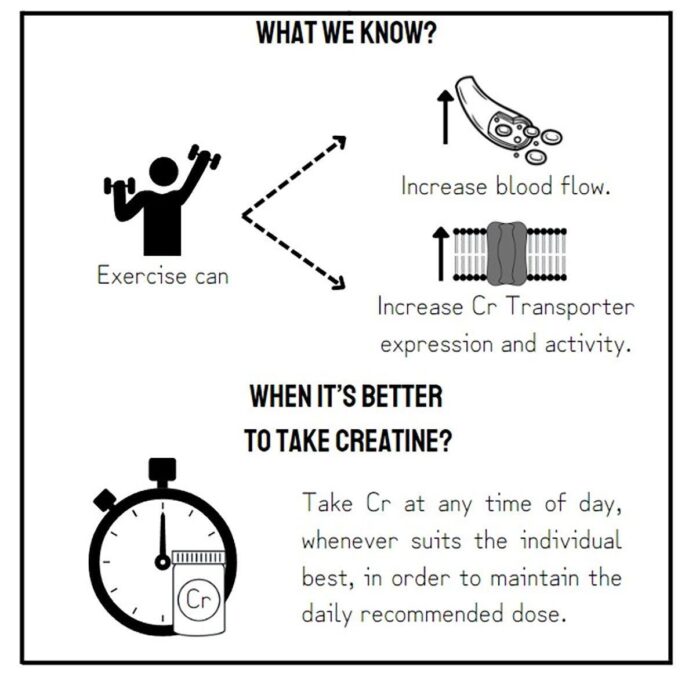When it comes to optimizing workout performance and muscle recovery, few supplements have garnered as much attention as creatine. This natural compound, revered for its ability to enhance strength and promote lean muscle mass, has found its way into the routines of athletes and fitness enthusiasts alike. However, amidst the myriad of guidelines and recommendations surrounding creatine supplementation, one question looms large: when is the best time to take it? Morning, night, or right after your workout? in this article, we’ll delve into the science behind timing your creatine intake, explore the potential benefits of different dosing schedules, and equip you with the details needed to make an informed decision tailored to your fitness goals.Whether you’re a seasoned gym-goer or just starting your health journey, understanding the optimal timing for creatine can unlock pathways to better performance and recovery.
The Science Behind Creatine Timing and Muscle Recovery
When considering the timing of creatine supplementation, scientific research reveals intriguing insights into muscle recovery and performance enhancement. Creatine serves as a critical energy reservoir in the form of phosphocreatine, which supports ATP (adenosine triphosphate) regeneration during high-intensity activities. By optimizing the timing of creatine intake, notably post-workout, athletes can possibly maximize recovery and muscle adaptation. Studies suggest that consuming creatine immediately after exercise may promote better muscle uptake due to increased blood flow and nutrient sensitivity, making it an effective strategy for replenishing depleted stores and promoting muscle repair.
additionally, the implications of consistent creatine use extend beyond workout timing. It is indeed essential to consider a combination of training regimen, nutrition, and overall supplementation protocol. Factors that can influence creatine effectiveness include:
- Personal Fitness Goals: Bulking, cutting, or maintaining.
- Type of Exercise: Powerlifting vs. endurance training.
- Dietary Intake: Carb consumption can enhance creatine uptake.
The nuances of creatine timing are further illustrated in the table below, which highlights optimal timing based on activity levels and potential recovery benefits:
| Timing | Activity Level | Expected Benefits |
|---|---|---|
| Morning | Light Activity | Prepares muscles for the day ahead |
| Post-Workout | High Intensity | Facilitates recovery and muscle growth |
| Night | Rest Days | Supports ongoing recovery and ATP replenishment |

Morning vs. Night: Examining the Optimal Window for Creatine Intake
When considering when to take creatine, the debate often hinges on whether morning or night provides the best results. Advocates for morning intake argue that starting your day with a dose of creatine can enhance energy levels and cognitive function throughout various activities. This early boost has the potential to set a positive tone for the day, especially for those engaging in workouts or other demanding tasks. Additionally, some studies suggest that taking creatine in the morning may synchronize better with the body’s natural rhythms, promoting effective absorption and utilization throughout the day.
Conversely,nighttime supplementation has its own merits. Taking creatine at night may allow for better recovery and muscle repair during sleep, capitalizing on the anabolic processes that occur overnight. This can be particularly beneficial for those who train later in the day, ensuring that the muscle glycogen stores are replenished and optimized while the body is in recovery mode. Ultimately,the ideal timing may vary based on personal schedules and training routines,making it crucial to assess individual needs when deciding on the optimal window for creatine intake.

Post-Workout Benefits: Maximizing Gains with Creatine After Exercise
After a rigorous workout,your muscles are primed for recovery and growth,making it an optimal time to consider supplementing with creatine. This powerful compound enhances muscle performance by replenishing ATP (adenosine triphosphate) levels, which are depleted during intense exercise. Post-workout, creatine can help to:
- Accelerate muscle recovery by reducing soreness
- Increase muscle hydration, leading to improved strength and performance in future workouts
- Promote muscle protein synthesis, supporting overall muscle growth
Integrating creatine into your post-workout routine can also amplify glycogen replenishment, especially when consumed with carbohydrates. This combination facilitates enhanced energy storage,making it easier to tackle subsequent workouts.A simple yet effective strategy is to pair your creatine with a post-workout shake or meal. Here’s a speedy look at some ideal combinations:
| Time | Recommended Creatine Pairing |
|---|---|
| Immediately post-Workout | Creatine with a protein shake and banana |
| 1 Hour Post-Workout | Creatine with a meal rich in carbs and protein |
| Evening Post-Workout | Creatine in a yogurt or smoothie |

Personalizing Your Routine: Factors to Consider for creatine Timing
When it comes to optimizing your creatine routine, several key factors can influence the timing of supplementation. one of the moast important aspects to consider is your training schedule. If you typically work out in the morning, consuming creatine alongside your pre-workout meal might yield the best results. It provides a direct energy supply right before you exert yourself. For evening workouts, taking creatine post-exercise can support recovery and lessen the potential for nighttime gastrointestinal discomfort.Additionally, your daily schedule and meal timings will play a crucial role in determining when to incorporate creatine into your regimen.
Another factor to account for is your body’s response to creatine. Some individuals may experience enhanced performance and quicker recovery when creatine is taken after workouts,while others might benefit more from pre- or morning dosing. Assessing your own body’s feedback can provide valuable insights.Additionally, consistency is crucial, so whether you choose to take it at night or in the morning, maintaining a regular schedule will ensure optimal muscle saturation. Here’s a quick overview of the timings:
| Time of Day | Benefits |
|---|---|
| Morning | Boosts energy for the day; enhances workout readiness. |
| Post-Workout | Supports recovery; replenishes creatine and glycogen stores. |
| Night | May aid in overnight recovery; less likely to interfere with morning workouts. |
The Conclusion
determining the best time to take creatine ultimately hinges on individual preferences, lifestyle, and workout schedules. Whether you prefer to kickstart your day, enhance your post-workout recovery, or integrate it seamlessly into your nighttime routine, the key is consistency. As you explore the timing that feels right for your body, remember that the benefits of creatine can be reaped regardless of the clock’s hands. Listen to your body, adjust as needed, and let your fitness journey unfold at its own pace. After all, it’s not just about when you take creatine—it’s about how it fits into the mosaic of your health and wellness goals. so, embark on this journey with an open mind, and may your pursuit of strength and endurance be as boundless as your potential.



